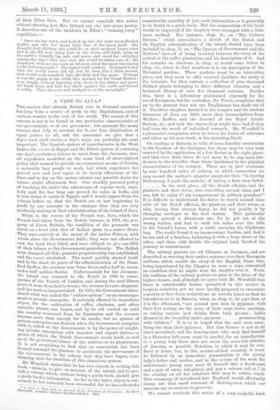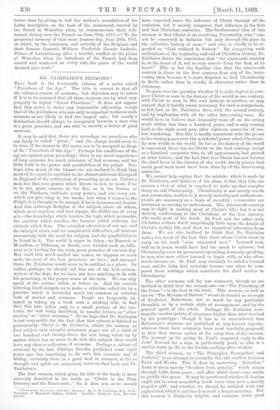A VISIT TO JAVA.*
THE success that attends British rule in Oriental countries has long been a source of pride to the Englishman, and of envious wonder to the rest of the world. The reason of this success is not to be found in one particular characteristic of our government, or of our governors ; but amongst the many reasons that help to account for it, our firm distribution of equal justice to all, and the assurance we give that a - day's work shall receive a day's wage, are probably the most important. The Spanish system of reparlimienlae in the West Indies, the corvee in Egypt, and the Dutch system of extorting one day's gratuitous labour in seven from the Javanese, were all expedients modelled on the same kind of short-sighted policy that seemed to provide an economical means of forcing a naturally lazy people to work, but which experience has proved over and over again to be barely efficacious at the time, and to dry up the spring whence any possible desire for labour might afterwards flow. Our steadily pursued policy of teaching the native the advantages of regular work, regu- larly paid for, has long ago proved its value in India, and Is now doing so again in Egypt; and it would appear from the volume before us, that the Dutch are at last beginning to profit by our example in the changes that they are very gradually making in their administration of the island of Java.
When in the course of the French war, Java, which the French had taken from the Dutch, became, in 1811, the pro- perty of Great Britain, the condition of the peasants was about on a level with that of Indian ryota in a native State. They were entirely at the mercy of the native Princes, with whom alone the Government dealt; they were not allowed to 'Own the land they tilled, and were obliged to give one-fifth of their labour to the Government gratuitously. The British soon changed all this ; peasant-proprietorship was established, 'and the corvoe abolished. The result quickly showed itself, and in the short six years of the administration of Sir Stam- ford Raffles, the revenue rose from three-and-a-half to seven- und-a-half million florins. Unfortunately for the Javanese, the island was restored to the Dutch in 1816 in conse- quence of the Treaty of London, and during the next"fifteen years it went from bad to worse ; the revenue became stagnant, and the natives impoverished. In 1830, the Government intro- duced whet was called the "culture system" as an encourage- ment to private enterprise. It certainly effected its immediate object, for the cultivation of coffee, cinchona, and other valuable plants, was begun, and by its aid carried on until the country recovered from its depression and the revenue
came more than enough for its needs ; but no system of private enterprise can flourish when the Government competes with it, aided as the Government is by the power of weight- ing private enterprises with taxation and export duties,—a power of which the Dutch as of the gratuitoua laboti Government avails itself, as well It is not surprising to t• of the natives on its plantations. find that an association has been formed amongst the plante' • to accelerate the movements of the Government in the e reform that they have begun, eora- ramming with the abolition of this obnoxious system. Mr. Worsfold states that h
book es a e has two objects in writing this ,—namely, to give an account f vide a volume which without t n o the island, and to pro-
vide being a
a guide-book's informationw1guide-book, should give
oerned, he has certainly. As far as the latter object is con- been successful, for he has collected a
* A Visit to T
Word0 id aua, with an Acronnt of th P . London: Richard Be ri Faced of Singnpore. Ily Bapil n ey and Bon. 1898, considerable quantity of just such information as is generally to be found in a guide-book. But the composition of the book would be improved if the chapters were arranged with a little more method. For instance, chap. ix., on "The Culture System," which necessitates a sketch of the Dutch and the English administration of the island, should have been included in chap. iii. on "The System of Government and the Natives," instead of being inserted between the story of his arrival at the coffee plantation, and his description of it. And his remarks on cinchona in chap. xi. would come better in chap. vii., where he first mentions it in his description of the Botanical gardens. These gardens must be an interesting place, and they seem to offer unusual facilities for study to the botanist, for they contain a collection of nine thousand distinct plants belonging to three different climates, and a botanical library of over five thousand volumes. Besides this, there is a laboratory maintained expressly for the use of foreigners, but the custodian, Dr. Treub, complains that up to the present time not one Englishman has made use Of it. The three chapters devoted to the temples and the ancient literature of Java are little more than transcriptions from Wallace, Raffles, and the Journal of the Royal Asiatic Society, Sm., and lack the charm they might have had if they had been the result of individual research. Mr. Worsfold is a pleasanter companion when he leaves his books of reference and takes up his note-book, or his sketching-block.
On landing at Batavia, he tells of some fanciful restrictions to the freedom of the foreigner, but these may be very soon removed by the application of a few florins in the right place ; and that once done, there do not seem to be any more hin- drances to the traveller than those incidental to the physical characteristics of the country. These are in part overcome by nine hundred miles of railway, in which connection we may record the author's singular complaint that, "in leaving Buitenzorg, I made the mistake of taking a first-class ticket.
In the next place, all the Dutch officials, and the planters, and their wives, were travelling second class, and I was left to enjoy (?) my compartment in solitary grandeur:" It is difficult to understand his desire to travel second class with all the Dutch officials, the planters, and their wives, or why, having that strange fancy, he did not gratify it by changing carriages at the first station. This particular journey proved a disastrous one, for he got out at the wrong station, and had to walk ten miles over the hills to his friend's house, with a coolie carrying his Gladstone bag. The coolie found it an inconvenient burden, and tied it to one end of a bamboo, balancing it with a large stone at the other, and then, with double his original load, finished his journey in contentment.
The railway porters are all Chinese, or Javanese, and are described as wearing their native costume over their European uniform, which recalls the story of the English Dean who, being importuned by his Chapter to wear a cope, consented on condition that he might wear his surplice over it. From the uniform of the railway porters we pass to the dress of the higher classes, and, although we agree with Mr. Worsfold that there is considerable license permitted in this matter in tropical countries, yet we were hardly prepared to encounter a society so free from restrictions at certain times as that he introduces us to in Batavia, when, in chap. ii,,-he says that, at 4 in the afternoon, "are around you men in pyjamas, with their feet resting on the arms of their easy-chairs, smoking, or taking various iced drinks from long glasses ; ladies dressed in the beautiful native garment promenading with children." It is to be hoped that the men wear some- thing else than their pyjamas. But this license is not at all times permitted, and the dancing-man who may find himself in a Batavian ball-room must be careful, for an introduction to a young lady there does not mean the mere ten minutes of dancing, oi• possible flirtation, to which it may be con- fined at home, but, in this matter-of-fact country, it must be followed by an immediate presentation to the young lady's father and mother, and in the course of the week the unfortunate young man must fit himself into a frock-coat and a pair of white kid-gloves and pay a solemn call at 7 in the evening on all her relations that may be within reach. This ceremony, if introduced into England, would effectually stamp out that small remnant of dancing-men which our matrons are so anxious to preserve.
We cannot conclude this notice of a very readable book better than by giving in full the author's translation of the Latin inscription on the base of the monument, erected by the Dutch in Waterloo plain, to commemorate their cele- brated victory over the French on June 20th, 1815 :—" To the perpetual memory of that most famous day, June 20th, 1815, on which, by the resolution and activity of the Belgians and their famous General, William Frederick George Ludovic, Prince of Luxembourg, after a terrible conflict on the plains of Waterloo, when the battalions of the French had been routed and scattered on every side, the peace of the world dawned once more."



































 Previous page
Previous page